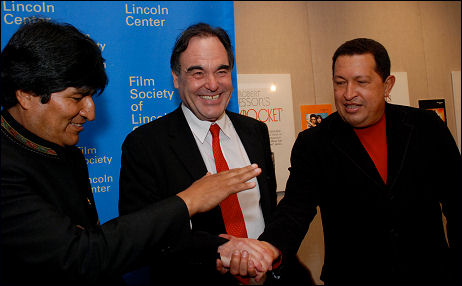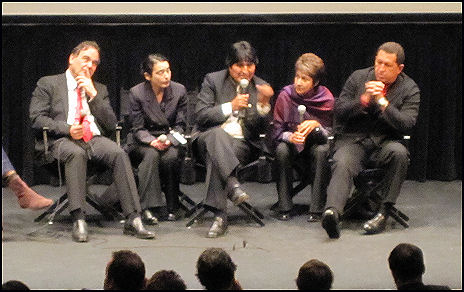Last night I managed to attend a hard-to-penetrate screening of Oliver Stone ‘s South of the Border at Lincoln Center’s Walter Reade theatre. Being the ardent lefty that I am and always will be, I was somewhat pleased and even comforted by what I saw. Is Stone’s documentary a hard-hitting portrait of South American political realities and particularly the reign of Venezuelan president Hugo Chavez? No, but it’s a perfectly reasonable and welcome counter-view to the U.S. mainstream-media Kool-Aid version, which has always been reactionary and rightist-supporting and hostile to nativist movements.

Bolivan president Evo Morales, South of the Border director Oliver Stone, Venezuelan president Hugo Chavez following last night’s screening at Lincoln Center’s Walter Reade theatre.
And I was surprised by two things. One was the attendance of the film’s leading light, Venezuelan president Hugo Chavez, as well as Bolivian president Evo Morales. The other was the fact, contrary to certain slanted reactions to a recent Venice Film Festival screening, that South of the Border is a good deal more than just a friendly (i.e., non-condemning) portrait of Chavez. It is actually a group portrait of all the left-leaning South American heads of state whose views represent a political sea change.
All my life (or at least until recently) the leaders of South American countries have been largely run by right-leaning frontmen for the oligarchs (i.e., the upper-crust elite), which have always been in league with U.S. interests and the coldly capitalist, market-driven finaglings of the International Monetary Fund. And the lower classes have always had to eat bean dip.
But since the turn of the century a turnabout has begun to happen with the arrival of a generation of Bolivarian (i.e., nativist, anti-outsider) leaders with skeptical or contrarian attitudes about US manipulations — Venezuela’s Chavez, Bolivia’s Morales, Brazil’s Lula da Silva, Argentina’s Cristina Kirchner (along with her husband and ex-President Nestor Kirchner), Paraguay’s Fernando Lug, and Ecuador’s Rafael Correa.
So now there are six Latin American presidents of a similar mindset, and seven if you add Cuba’s Raul Castro. That’s pretty significant considering that much of South and Central America had been under the control of a series of U.S.-supporting, IMF-funded rightist governments for most of the 20th Century.
So it’s a pleasure and a relief to see not just a fair-minded, turn-the-other-cheek film about Chavez — a man I’ve always admired and sympathized with since seeing The Revolution Will Not Be Televized. And I don’t care what the HE right-wingers are sure to say about this because they don’t want to get it. Chavez has been at war with Venezuelan right-wing interests (including the TV stations) for most of the last seven years, and if he sleeps with both eyes closed for more than two hours he’ll be unseated. He isn’t perfect — who is? — but at least he belongs to Venezuela and Venezuela alone.
The usual lefty crowd attended last night’s screening — Susan Sarandon, Danny Glover, Doug Liman, Courtney Love, producer Ed Pressman. Wall Street 2 costars Carey Mulligan and Shia Leboeuf were sitting three rows in front of me.
Stone, Chavez and Morales conducted a q & a following the film with Film Society of Lincoln Center chief Richard Pena moderaing. A cocktail gathering happened in an adjacent room. I wasn’t invited to that part of the event and I didn’t care.
Here’s Stone’s official statement:
“In January 2009, I travelled to Venezuela to interview President Hugo Chavez. Once we began our journey, however, we found ourselves telling a larger and even more compelling story, which we call South of the Border.

“Leader after South American leader seemed to be saying the same thing. They wanted to control their own resources, strengthen regional ties, be treated as equals with the U.S., and become financially independent of the International Monetary Fund. Based on our experiences in Iraq, Americans need to question the role of our media in demonizing foreign leaders as our enemies. The consequences of this can be brutal.
“This is a continuing story. It is going on right now with Hugo Chavez in Venezuela. Hopefully, in our film, you’ll get to hear a far different side of the ‘official’ story.”












